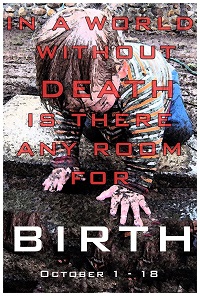
Birth, On Stage at Campbell House, is Clever and Chilling
By now, I’m sure you’ve probably been told by somebody, “You don’t know what you have until it’s actually gone.” But have you ever stopped to wonder how this principle would apply to those abstract things that can’t be quantifiably measured?
Currently playing at the Campbell House Museum, Birth is a dystopian fantasy in which playwright Tom Arthur Davis explores the question, “In a world without death, is there any room for birth?”
To explore this theme, Davis’ production is divided into three distinct acts.
Part I: All That Remains
In this opening act, we are introduced to this play’s main premise: sometime in the unspecified future, science has enabled people to live forever. But to control the world’s population, the act of giving birth has become heavily regulated, and only those with status are allowed to do so. A death sentence awaits all who would contravene these government-imposed birthing laws, including children brought into the world without permission.
It’s honestly a very intriguing premise, and one I felt was well-executed throughout the play.
The audience is immediately made privy to the social disparity of this fictional society, through Davis’ use of combining two separate stories into a single narrative.
We are first introduced to Greg (Jesse Nerenberg) and Louise (Tenille Read) – a power couple in the media who discover a secret warehouse that’s the hiding place for abandoned children. This couple is the very definition of classism. Instead of seeing this as a whistleblower opportunity to change what’s wrong with their society, they see it as a forum for personal gain – a news story that will bring unrivaled viewership.
“We can’t empathize. We can’t even sympathize. We can only pity.”
At the same time, a separate scene plays out in conjunction.
We are also introduced to Johanna (Pamela Mala Sinha), a destitute mother who is being interrogated by the government about her illegitimate son. It’s a stark contrast from the wealthy lifestyle of Greg and Louise, and it also the audience’s first insight into the glaring divide between the rich and poor.
In this society, only the rich are given permission to have children, which as you can imagine, causes real outrage amongst the less fortunate.
Part II: One of Your Own
In part II, the disparity between rich and poor is further examined as we are introduced to a couple of kidnappers – Ramona (Eve Wylden) and Andrew (Tom Arthur Davis) – who have taken a senator’s son in protest of the government-imposed Birthing Laws. This story line continues amidst the raids on the secret warehouses, in which Ramona’s own daughter, Danielle, is being hidden away.
Shown concurrently to this, is the aftermath where the senator (Marcel Dragonieri) and his aide (Justin Miller) have found the kidnapper’s hideout, shortly after they’ve abandoned it.
For me, this was the most poignant part of the play.
On one hand, we hear the words of a broken mother who just wants to save her daughter’s life. On the other, is the senator – whose politics drove the kidnappers to this extreme – lamenting the loss of his son. And although many would find him deserving of this tragedy, it’s still heartbreaking nonetheless to see a father mourn the death of his own.
There lies the real strength of this play. Playwright Davis was able to create such vivid, sympathetic characters one couldn’t help but empathize with. This act really brought his dystopian vision to life.
Part III: Into the Abyss
This element of the production actually features an online video, running roughly eight minutes, that chronicles Danielle’s (Astrid Van Wieren) detainment after the warehouse she was hiding in was found. Conceptually, I thought having a separate at-home element really enhanced this play’s narrative. It allowed the story to continue in the comfort of the theatre-goer’s home and provided a sense of continuity by literally making the story hit home. The only criticism I have, which is actually a major one, has to do with its production value. Static was deliberately inserted between parts of the monologue, but the audio mastering was inconsistent. The actor’s voice was really quiet and would suddenly be interrupted by the jarringly loud static. It really detracted from the whole experience.
As a whole, I found the writing and execution of this play to perhaps be the strongest of the productions I’ve watched all year. All actors were memorable and seemed to be perfectly cast in their roles. Birth is an amazing production, performed by talented actors who really bring the story to life. It’s definitely something you should see while you still have the chance.
Details:
- Birth is playing until October 18th at the Campbell House Museum (160 Queens Street West)
- Shows run from Wednesday through Friday at 7:30 p.m., with an additional showing on Saturday, October 18th
- Tickets cost $25, and are available online or in-person at the box office. Please note that seating is very limited and no latecomers are permitted into the show.
Photo by Tom Arthur Davis
